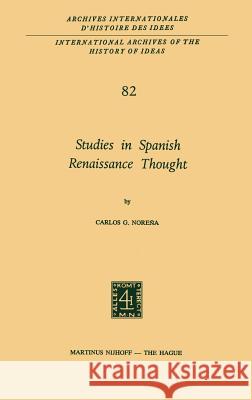Studies in Spanish Renaissance Thought » książka
Studies in Spanish Renaissance Thought
ISBN-13: 9789024717279 / Angielski / Twarda / 1975 / 277 str.
In spite of its carefully planned - and fully justified - modesty, the title of this book might very well surprise more than one potential reader. It is not normal to see such controversial concepts as "Renaissance," "Renaissance Thought," "Spanish Renaissance," or even "Spanish Thought" freely linked together in the crowded intimacy of one single printed line. The author of these essays is painfully aware of the com plexity of the ground he has dared to cover. He is also aware that all the assumptions and connotations associated with the title of this book have been the subject of great controversy among scholars of high repute who claimed (and probably had) revealing insight into human affairs and ideas. That these pages have been written at all therefore needs some justification. I am convinced that certain of the disputes among historians of ideas do not touch upon matters of substance, but rather reveal the taste and intellectual idiosyncracies of their authors. Much of the disagreement is, I think, a matter of aesthetics. Those who find special gratification in well-defined labels, clear-cut schemes, and compre hensive generalizations, can hardly bear the company of those who insist upon detail, complexity, and organic growth. The nightmarish dilemma, still unresolved, between Unity and Diversity, between the Universal and the Individual, haunts the History of Ideas.











